A Number by Caryl Churchill – a philosophical analysis
Lillian Wilde is a graduate in the field of phenomenology. In this guest blog post, she asks some existential questions about a soon-to-be-staged play on human cloning.
That Theatre, an English-language theatre group in Copenhagen, is staging the play ‘A Number’ by Caryl Churchill in February and March 2018. The play, which explores the consequences of human cloning, will be preceded by a debate organised by Mike Young Academy. 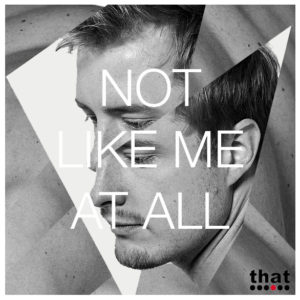 That is why Mike Young Academy invited Lillian Wilde, a philosopher and visual artist, to analyse the play, and to interpret it in the form of a series of visuals based on photos of the actors.
That is why Mike Young Academy invited Lillian Wilde, a philosopher and visual artist, to analyse the play, and to interpret it in the form of a series of visuals based on photos of the actors.
The ethics of human cloning
Caryl Churchill’s play ‘A Number’ is about the ethics of human cloning – at least on the surface. I say ‘on the surface’ because to me as a philosopher, the questions she asks strike me as working at a deeper existential level. The play leaves out the debate we typically associate with cloning. Instead, Churchill takes human cloning as a framework for philosophical considerations. First and foremost, she discusses the question of personal identity:
Who am I?
What makes me me?
Am I unique?
A series of questions unfolds in the play from here.
The Problem of Twinship
Salter: Even one, a twin, would be a shock
Bernard 2: A twin would be a surprise but a number
Salter: A number any number is a shock.”Caryl Churchill, A Number
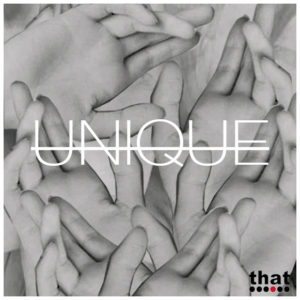 Twins are natural clones: they are two organisms that evolved from one fertilised egg and carry the identical genetic makeup as each other. Often, we tend to think of them as one entity. But are twins actually identical? PhD candidate at the University of Kent and specialised twin researcher James W. Hoctor, disagrees with the widespread notion that twins form a singular entity or that they possess a ‘we-self’. He argues instead that twinship is “a joint enterprise which includes a sense of self and other.”
Twins are natural clones: they are two organisms that evolved from one fertilised egg and carry the identical genetic makeup as each other. Often, we tend to think of them as one entity. But are twins actually identical? PhD candidate at the University of Kent and specialised twin researcher James W. Hoctor, disagrees with the widespread notion that twins form a singular entity or that they possess a ‘we-self’. He argues instead that twinship is “a joint enterprise which includes a sense of self and other.”
Personal Identity
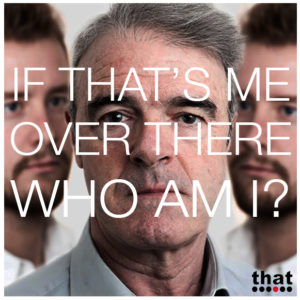 Hoctor grounds his argument on a phenomenological theory of the ‘minimal self’: according to Dan Zahavi, Professor of Philosophy at the University of Copenhagen, the self in its most minimal sense – leaving out life story, social connections, personal traits etc. – can be understood as someone’s first-person-perspective.
Hoctor grounds his argument on a phenomenological theory of the ‘minimal self’: according to Dan Zahavi, Professor of Philosophy at the University of Copenhagen, the self in its most minimal sense – leaving out life story, social connections, personal traits etc. – can be understood as someone’s first-person-perspective.
Salter: because if that’s me over there who am I?
Bernard 2: yes but it’s not me over there.”
Caryl Churchill, A Number
The fact that I experience from my very own point-of-view that is different to everyone else’s is enough to account for the fact that I am me; whether I have a twin with the same genetic material as me or not. Why, then, would a twin be a shock?
Original and Copy
“Bernard 2: what if someone else is the one, the first one, the real one…”
Caryl Churchill, A Number
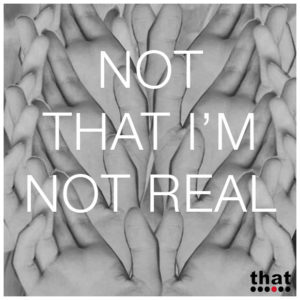 In the play, the concern is raised about originality . The worry seems to be twofold: Is a copy less ‘real’ than an original? And does the original lose anything, its identity or value, by being copied? If we turn to the art world we see: even the most precise, magnificent forgery of an artwork remains a ‘fake’ and is worth nothing compared to the master’s original, which does not lose either its value or its identity.
In the play, the concern is raised about originality . The worry seems to be twofold: Is a copy less ‘real’ than an original? And does the original lose anything, its identity or value, by being copied? If we turn to the art world we see: even the most precise, magnificent forgery of an artwork remains a ‘fake’ and is worth nothing compared to the master’s original, which does not lose either its value or its identity.
There are two problems with this in applying it to a human (or any other conscious being): the concept of the minimal self tells us that there is, in fact, a unique self to every conscious being.
And then there is another question: Can we measure the value of a human being at all?
The Value of a Human Life
Bernard 2: The value of those people…
Salter: What? Is it money? Is it something you can put a figure on?”
Caryl Churchill, A Number
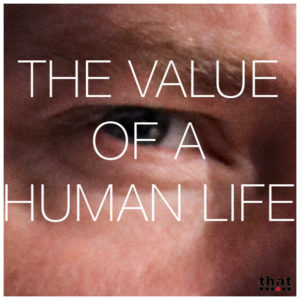 How do we measure how much a person is worth? Economists have come up with one answer: the ‘value of statistical life’ estimates first how much people are willing to pay to reduce their individual risk of dying by 1 in 100,000. Distributed over 100,000 study participants, this risk reduction would lead to one saved life, statistically speaking. Say that everyone was willing to pay $100, it follows that “the total dollar amount that the group would be willing to pay to save one statistical life … would be $100 per person × 100,000 people, or $10 million.” Easy, right?
How do we measure how much a person is worth? Economists have come up with one answer: the ‘value of statistical life’ estimates first how much people are willing to pay to reduce their individual risk of dying by 1 in 100,000. Distributed over 100,000 study participants, this risk reduction would lead to one saved life, statistically speaking. Say that everyone was willing to pay $100, it follows that “the total dollar amount that the group would be willing to pay to save one statistical life … would be $100 per person × 100,000 people, or $10 million.” Easy, right?
But, granted we can put a figure on it, is the value of a person really impacted by the existence of a copy? Is the copy worth less? Asked differently, is a twin less valuable than someone whose genetic material is unique?
Nature vs. Nurture
“Bernard 2: someone like you couldn’t have tried harder… If you’d tried harder you’d have been different from what you were like and you weren’t.”
Caryl Churchill, A Number
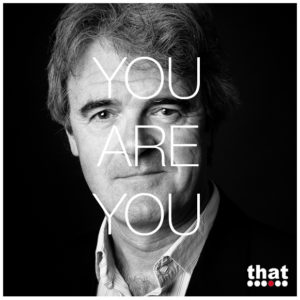 This leads me to my last inquiry. How identical are identical clones (or twins, for that matter) really? Is the genetic material the main determining factor of someone’s identity? What role does upbringing, culture, and circumstances play?
This leads me to my last inquiry. How identical are identical clones (or twins, for that matter) really? Is the genetic material the main determining factor of someone’s identity? What role does upbringing, culture, and circumstances play?
Caryl Churchill addresses these issues entertainingly, and with increasing urgency in ‘A Number’.
‘A Number’ premiered at That Theatre Company in Copenhagen on the 21st February 2018, following a panel debate with Joshua M. Brickman, Professor of Stem Cell and Developmental Biology, Mickey Gjerris, Associate Professor in Bioethics, and Pia Søltoft, Vicar of the Marble Church (Marmorkirken) with Mike Young as moderator.
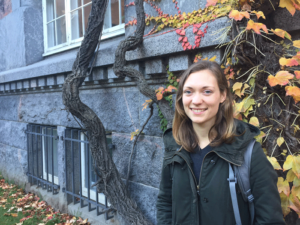 Lillian Wilde (right) is a philosopher and visual artist. All the illustrations for this article are by her. Her website is here.
Lillian Wilde (right) is a philosopher and visual artist. All the illustrations for this article are by her. Her website is here.
Planning a conference or event? Need a panel moderator? See Mike Young Academy’s conference and events page here.

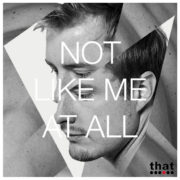


Besides the phenomenological point of view, your analysis made me immediately think of the psychoanalytical discussion on otherness and the concept of “the double”. I wonder if the author had Freud’s idea of the Doppelgänger in mind when writing the script. 🙂 Anyway, great work. It seems something that could lead to a very interesting discussion.
Thank you Vania for your interesting point. Indeed, one does not need a genetically identical copy to be confronted with oneself.
thank you for this wonderful analysis
Thanks Limbu! Mike
Interesting article Lillian, and I am really looking forward to seeing the play in February! I will add to Vania’s point above, and use the opportunity to name drop Dostoyevsky’s ‘The Double’. Here a government official slowly goes mad as he keeps on meeting his exact duplicate. His double is a cooler version of himself.
I have noticed you don’t monetize your blog, don’t waste your traffic, you can earn additional bucks every month.
You can use the best adsense alternative for any type of website (they approve all websites), for more info simply search in gooogle: boorfe’s tips monetize your website
Thank you so much for this as m y theater company will be taking this one on in November